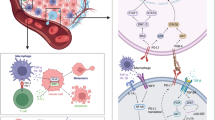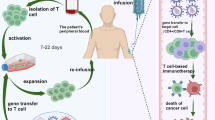Abstract
These experiments were conducted to investigate whether the antimetastatic effects of HSVtk/GCV therapy involve T-cell-mediated immune responses. In the first experiment, immunocompetent syngeneic mice were inoculated with metastatic mammary cancers, then given a direct intratumoral injection of a plasmid vector containing a suicide gene (pHSVtk) or control vector once a week for 8 weeks. Gene electrotransfer treatment was applied to the tumors, and mice were administered ganciclovir (GCV) using a mini-osmotic pump. At the end of the experiment, tumor volume was significantly lower in the pHSVtk/GCV group. Macrophage accumulations were frequently observed in the peripheries of the necrotic regions in pHSVtk-transfected mice. Levels of CD4 and CD8 proteins in tumors were higher in the pHSVtk/GCV group than in the control group. Interleukin (IL)-12 mRNA levels tended to be higher in tumors in the pHSVtk/GCV group, but there were large variations. Tumor microvessel density was significantly lower in the pHSVtk/GCV group. The numbers of dilated lymphatic vessels containing intraluminal tumor cells tended to be higher in the pHSVtk/GCV group. However, vascular endothelial growth factor (VEGF)-A and VEGF-C mRNA levels in tumors were similar in the control and pHSVtk/GCV groups. In the second experiment, tumor volume and metastatic parameters were compared for immunocompetent syngeneic mice and immunodeficient athymic mice (without an intact T-cell system) given pHSVtk/GCV therapy. Although tumor volumes were significantly smaller in both syngeneic and athymic mice given pHSVtk/GCV therapy, the inhibition ratios (relative to control mice) were much greater in syngeneic mice than in athymic mice. No suppression of metastasis to the lymph nodes and lungs was observed for athymic mice given pHSVtk/GCV therapy. Our data suggest that HSVtk/GCV suicide gene therapy exerts an antimetastatic effect via a T-cell-mediated immune response.
Similar content being viewed by others
References
Moolten I (1994) Drug sensitivity (“suicide”) genes for selective cancer therapy. Cancer Gene Ther 1:107–112
Culver KW, Ram Z, Wallbridge S, Ishii H, Oldfield EH, Blaese RM (1992) In vivo gene transfer with retroviral vector-producer cells for treatment of experimental brain tumors. Science 256:1550–1552
Freeman SM, Ramesh R, Marrogi AJ (1997) Immune system in suicide-gene therapy. Lancet 349:2–3
Yamamoto S, Suzuki S, Hoshino A, Akimoto M, Shimada T (1997) Herpes simplex virus thymidine kinase/ganciclovir-mediated killing of tumor cell induces tumor-specific cytotoxic T cells in mice. Cancer Gene Ther 4:91–96
Mesnil M, Piccoli C, Tiraby G, Willecke K, Yamasaki H (1996) Bystander killing of cancer cells by herpes simplex virus thymidine kinase gene is mediated by connexins. Proc Natl Acad Sci U S A 93:1831–1835
Freeman SM, Abboud CN, Whartenby KA, Packman CH, Koeplin DS, Moolten FL, Abraham GN (1993) The “bystander effect”: tumor regression when a fraction of the tumor mass is genetically modified. Cancer Res 53:5274–5283
Shibata MA, Morimoto J, Otsuki Y (2002) Suppression of murine mammary carcinoma growth and metastasis by HSVtk/GCV gene therapy using in vivo electroporation. Cancer Gene Ther 9:16–27
Shibata MA, Morimoto J, Doi H, Morishima S, Naka M, Otsuki Y (2007) Electrogene therapy using endostatin, with or without suicide gene therapy, suppresses murine mammary tumor growth and metastasis. Cancer Gene Ther 14:268–278
Colombo F, Barzon L, Franchin E, Pacenti M, Pinna V, Danieli D, Zanusso M, Palu G (2005) Combined HSV-TK/IL-2 gene therapy in patients with recurrent glioblastoma multiforme: biological and clinical results. Cancer Gene Ther 12:835–848
Shibata MA, Ito Y, Morimoto J, Otsuki Y (2004) Lovastatin inhibits tumor growth and lung metastasis in mouse mammary carcinoma model: a p53-independent mitochondrial-mediated apoptotic mechanism. Carcinogenesis (Oxf) 25:1887–1898
Morimoto J, Imai S, Haga S, Iwai Y, Iwai M, Hiroishi S, Miyashita N, Moriwaki K, Hosick HL (1991) New murine mammary tumor cell lines. In Vitro Cell Dev Biol 27A:349–351
Shibata MA, Akao Y, Shibata E, Nozawa Y, Ito T, Mishima S, Morimoto J, Otsuki Y (2007) Vaticanol C, a novel resveratrol tetramer, reduces lymph node and lung metastases of mouse mammary carcinoma carrying p53 mutation. Cancer Chemother Pharmacol 60:681–691
Shibata MA, Morimoto J, Ito Y, Kusakabe K, Otsuki Y (2004) Experimental gene therapy in mammary and urinary bladder cancer using electrogene transfer. Med Electron Microsc 37: 216–224
Shibata MA, Ito Y, Morimoto J, Kusakabe K, Yoshinaka R, Otsuki Y (2006) In vivo electrogene transfer of interleukin-12 inhibits tumor growth and lymph node and lung metastases in mouse mammary carcinomas. J Gene Med 8:335–352
Shibata MA, Liu M-L, Knudson MC, Shibata E, Yoshidome K, Bandy T, Korsmeyer SJ, Green JE (1999) Haploid loss of bax leads to accelerated mammary tumor development in C3(1)/SV40-Tag transgenic mice: reduction in protective apoptotic response at the preneoplastic stage. EMBO J 18:2692–2701
Gorrin-Rivas MJ, Arii S, Furutani M, Mizumoto M, Mori A, Hanaki K, Maeda M, Furuyama H, Kondo Y, Imamura M (2000) Mouse macrophage metalloelastase gene transfer into a murine melanoma suppresses primary tumor growth by halting angiogenesis. Clin Cancer Res 6:1647–1654
Livak KJ, Schmittgen TD (2001) Analysis of relative gene expression data using real-time quantitative PCR and the 2(-Delta Delta C(T)) Method. Methods 25:402–408
Shibata MA, Horiguchi T, Morimoto J, Otsuki Y (2003) Massive apoptotic cell death in chemically induced rat urinary bladder carcinomas following in situ HSVtk electrogene transfer. J Gene Med 5:219–231
Kuriyama S, Kikukawa M, Masui K, Okuda H, Nakatani T, Akahane T, Mitoro A, Tominaga K, Tsujinoue H, Yoshiji H, Okamoto S, Fukui H, Ikenaka K (1999) Cancer gene therapy with HSV-tk/GCV system depends on T-cell-mediated immune responses and causes apoptotic death of tumor cells in vivo. Int J Cancer 83:374–380
Fogar P, Greco E, Basso D, Habeler W, Navaglia F, Zambon CF, Tormen D, Gallo N, Cecchetto A, Plebani M, Pedrazzoli S (2003) Suicide gene therapy with HSV-TK in pancreatic cancer has no effect in vivo in a mouse model. Eur J Surg Oncol 29:721–730
Colombo MP, Trinchieri G (2002) Interleukin-12 in anti-tumor immunity and immunotherapy. Cytokine Growth Factor Rev 13: 155–168
Nastala CL, Edington HD, McKinney TG, Tahara H, Nalesnik MA, Brunda MJ, Gately MK, Wolf SF, Schreiber RD, Storkus WJ (1994) Recombinant IL-12 administration induces tumor regression in association with IFN-γ production. J Immunol 153: 1697–1706
Ikeda H, Old LJ, Schreiber RD (2002) The roles of IFN gamma in protection against tumor development and cancer immunoediting. Cytokine Growth Factor Rev 13:95–109
Rook G, Balkwill F (1998) Cell-mediated immune reactions, 5th edn. Mosby, London
Coughlin CM, Wysocka M, Trinchieri G, Lee WM (1997) The effect of interleukin 12 desensitization on the antitumor efficacy of recombinant interleukin 12. Cancer Res 57:2460–2467
Boggio K, Nicoletti G, Di Carlo E, Cavallo F, Landuzzi L, Melani C, Giovarelli M, Rossi I, Nanni P, De Giovanni C, Bouchard P, Wolf S, Modesti A, Musiani P, Lollini PL, Colombo MP, Forni G (1998) Interleukin 12-mediated prevention of spontaneous mammary adenocarcinomas in two lines of Her-2/neu transgenic mice. J Exp Med 188:589–596
Roy EJ, Gawlick U, Orr BA, Rund LA, Webb AG, Kranz DM (2000) IL-12 treatment of endogenously arising murine brain tumors. J Immunol 165:7293–7299
Salven P, Lymboussaki A, Heikkila P, Jaaskela-Saari H, Enholm B, Aase K, von Euler G, Eriksson U, Alitalo K, Joensuu H (1998) Vascular endothelial growth factors VEGF-B and VEGF-C are expressed in human tumors. Am J Pathol 153:103–108
Valtola R, Salven P, Heikkila P, Taipale J, Joensuu H, Rehn M, Pihlajaniemi T, Weich H, deWaal R, Alitalo K (1999) VEGFR-3 and its ligand VEGF-C are associated with angiogenesis in breast cancer. Am J Pathol 154:1381–1390
Kaipainen A, Korhonen J, Mustonen T, van Hinsbergh VW, Fang GH, Dumont D, Breitman M, Alitalo K (1995) Expression of the fms-like tyrosine kinase 4 gene becomes restricted to lymphatic endothelium during development. Proc Natl Acad Sci U S A 92: 3566–3570
Voest EE, Kenyon BM, O’Reilly MS, Truitt G, D’Amato RJ, Folkman J (1995) Inhibition of angiogenesis in vivo by interleukin 12. J Natl Cancer Inst 87:581–586
Author information
Authors and Affiliations
Corresponding author
Rights and permissions
About this article
Cite this article
Shibata, MA., Morimoto, J., Akamatsu, K. et al. Antimetastatic effect of suicide gene therapy for mouse mammary cancers requires T-cell-mediated immune responses. Med Mol Morphol 41, 34–43 (2008). https://doi.org/10.1007/s00795-007-0388-1
Received:
Accepted:
Published:
Issue Date:
DOI: https://doi.org/10.1007/s00795-007-0388-1




